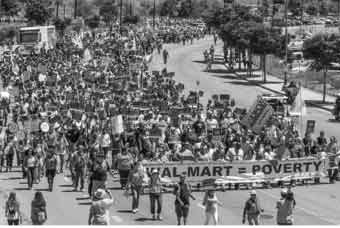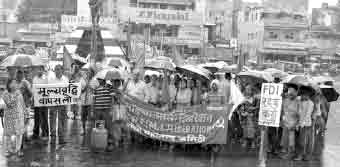COVER
Countrywide protests against Price Hike
and Anti-People Measures
In response to the CPI(ML)’s central call, CPI(ML) units all over the country implemented a Bharat Bandh strike on 20 September.
The unprecedentedly steep hike in the price of diesel and the move to limit subsidised cooking gas cylinders to six per family per year, as well as introduction of FDI in multi-brand retail and civil aviation are body blows to the common people’s livelihood and survival.
The limiting of cooking gas cylinders will mean that families will be forced to buy cooking fuel at market rates, imposing a severe burden on their already constrained circumstances. The hike in diesel prices will inevitably result in a hike in transport costs which, in turn, will impact on food prices.
The UPA Government’s claim that the hikes are justified in the light of losses suffered by oil companies is a shameless falsehood, since all the oil and gas companies have recorded substantial net profits. 
The UPA Government has arrogantly gone ahead with notification of FDI in multi-brand retail, claiming that this will bring down prices and create jobs. Ironically, at a time when India is rolling out the red carpet for retail MNC giants like Walmart and TESCO, they are facing unprecedentedly massive protest in the countries of their origin!
In the largest-ever protest against Walmart in U.S. history, thousands of Walmart workers and local resident in Los Angeles (especially the Chinatown area) held a rally against Walmart’s labour practices. The rally carried a massive banner that read: “Walmart = Poverty,” while protestors displayed placards saying “Walmart: How the 1% Hurts the 99%.”
A leader of the Walmart workers’ protest said, “Walmart’s chief product is poverty. Walmart gets rich by keeping its employees poor; however, Walmart workers are organizing for decent wages and affordable benefits. Until Walmart stops selling poverty, we don’t want it in Los Angeles.”
Ordinary Americans say Walmart sells poverty – and Manmohan Singh is now inviting the Walmarts of the world to come to peddle poverty in India!
For the ruling class opposition parties, the opposition to price hike and FDI in retail is merely a part of political bargaining and calculations. Therefore, Mamata Banerjee withdraws support from the Government but refuses to support the Bandh. And Mulayam Singh participates in a traders’ protest at Jantar Mantar but, in keeping with his Nuke Deal about-turn script, reiterates his support to the UPA Government in the name of ‘keeping communal forces out of power’ the very next day. Mayawati and Mulayam both, acutely aware of CBI cases against them that the Congress can use to its advantage, are both firmly with the Government.
For the people, however, intensifying protests is the only course. The Bharat Bandh of 20 September is only a foretaste. The UPA Government has betrayed its mandate – and must go!
Factory fire in Pakistan:
Subcontinent of Apathy
(We reproduce here an article by Indo-Pak journalist Sonya Fatah, which appeared in the Times of India, September 17)
Bangladesh, India and Pakistan may well be separate nations with independent flags, anthems and identities but the kind of human tragedy they offer the world is distinctly South Asian. There must be some deep-rooted web somewhere under the surface that reveals how wonderfully we treat our own citizens, especially if they happen to be struggling to survive.
Take for instance, the recent news out of Karachi that a clothing factory in the industrial part of town was engulfed in fire. The manager on duty, fearing the worst from his team of X hundred workers (we don’t know exactly how many), decided that it was in the best interest of his bosses to lock up the steel doors, just in case the fire gave anyone an idea to loot piles of stone-washed jeans ready for shipment to Europe, where the orders obtained would earn our manager’s sensible owners, a lucrative pile of Euros. Oh well, it was not to be. The manager, while ensuring his bosses’ safety and security, didn’t realize that there was a human pen inside that would have to die to protect inflammable material. Trapped inside - some three hundred people (or who knows) died, most of them of asphyxiation.
Only one news report casually - at its very bottom - revealed the names of the factory owners - a father and his two sons; Shahid, Ali and Arshad Bhela who ran a garment factory. Everywhere else it was simply reported that the ‘owners’ were on the lam. There was no mention of the factory address, the name of the business or those who would necessarily have to be held accountable for providing little to no basic security for the people working long shifts to maintain the health of the business.
A social activist in Pakistan, Sarwar Bari, writes in the Express Tribune, “How many factory owners belong to ruling parties and how many political parties are controlled by industrialists, who not only violate labour laws but also safety and hygiene standards. They blatantly violate rights of the workers who generate profits for them. They neither allow independent unions to function in their factories, nor do they fulfill their legal duty on their own.”
Bari has been fighting for the rights of power loom workers in Faisalabad, Jhang and Toba Tek Singh since 2003. In recent months, 25 workers have been electrocuted. Most likely all deaths could have been prevented had safety standards had been in place. Bari’s cynicism is not misplaced when he assumes that most of us, angered about the deaths of the Karachi 300+ will soon forget about it.
As I read about this tragedy I was reminded about the Amri Hospital fire in Kolkatta last December. Most of the 90 deaths there were a result of asphyxiation, which is normally what happens when there is a fire. But if the hospital authorities had called for an evacuation earlier, considering the basement housed a wide range of inflammable materials in its pharmacy, storeroom and biomedical department, many of those deaths could have been avoided.
Two years ago, Dhaka had its own garment factory tragedy when fire swept through a workroom of one floor. Workers trapped inside by sealed emergency exits, jumped to their deaths from the 10th floor windows. Some 27 people died and more than 100 were injured, months after another 25 people died in a sweater factory.
I’m not sure what’s happened in any of these places post these incidents.
Have workers rights improved? Given various power structures, the nexus between government and business, we can be proud that while we have our differences there are certain realities that still bind us together - reasons to fly those flags high.

